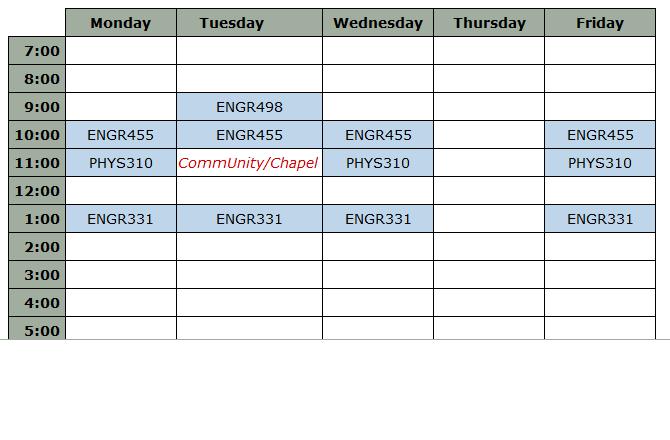Jodi S. Hodge: Difference between revisions
Jodi.Hodge (talk | contribs) |
Jodi.Hodge (talk | contribs) |
||
| (9 intermediate revisions by the same user not shown) | |||
| Line 22: | Line 22: | ||
==Homework== | ==Homework== | ||
---- | ---- | ||
Non links turned in as hardcopy | |||
[[ASN1 - Create Wiki Home Page]] | [[ASN1 - Create Wiki Home Page]] | ||
| Line 28: | Line 31: | ||
[[ASN3 - Show graphically that the exponential funtion shifted equals to the delta function shifted]] | [[ASN3 - Show graphically that the exponential funtion shifted equals to the delta function shifted]] | ||
ASN4 - Given a linear time-invariant system where <math>\ u(t) </math> produces an output <math>\ w(t) </math>, find the output due to any function <math>\ x(t) </math> | ASN4 - Given a linear time-invariant system where <math>\ u(t) </math> produces an output <math>\ w(t) </math>, find the output due to any function <math>\ x(t) </math> | ||
| Line 38: | Line 40: | ||
ASN7 - Finish the practice tests | ASN7 - Finish the practice tests | ||
[[ASN8 - FIR filters]] | |||
[[ASN9 - Decimating filter]] | |||
[[ASN10 - Frequency response of low pass filters ]] | |||
[[ASN11 - Our method versus Mark Flower's]] | |||
[[ASN12 - Determine resolution using cross correlation]] | |||
ASN13 - Derive DFT relations | |||
[[ASN14 - Idea for an adaptive FIR filter]] | |||
ASN15 - Do practice Exam II | |||
Latest revision as of 14:49, 6 December 2010
Wiki Page
This page was created as an assignment in ENGR455 Signals and Systems. The purpose of this page is to enable easy viewing by others of my completed homework assignments and easy peer reviewing. See web page for further details on topics.
Personal Background
I love going to the beach and especially love tanning right before I return to College Place. I love animals of all sorts but dearly dogs, cats, and parrots. I wish I could always speak in my West Indian dialect unfortunately, it is much too difficult for people to understand. This is my last quarter attending WWU to recieve my BS in EE. Thereafter, I plan to return to the Virgin Islands for employment in this career field.
Contact Information
Cell: 340-998-9369
Home: 509-524-6785
Email: jodi_montoute@yahoo.com
Class Schedule
Homework
Non links turned in as hardcopy
ASN3 - Show graphically that the exponential funtion shifted equals to the delta function shifted
ASN4 - Given a linear time-invariant system where produces an output , find the output due to any function
ASN5 - Find and relate it to the Laplace Transform. Derive the Inverse Laplace Transform of this from the inverse Fourier Transform.
ASN6 - Pick a property of the Fourier Transform & present it on the Wiki. Make a table with all your properties. Interpret your property.
ASN7 - Finish the practice tests
ASN10 - Frequency response of low pass filters
ASN11 - Our method versus Mark Flower's
ASN12 - Determine resolution using cross correlation
ASN13 - Derive DFT relations
ASN14 - Idea for an adaptive FIR filter
ASN15 - Do practice Exam II
